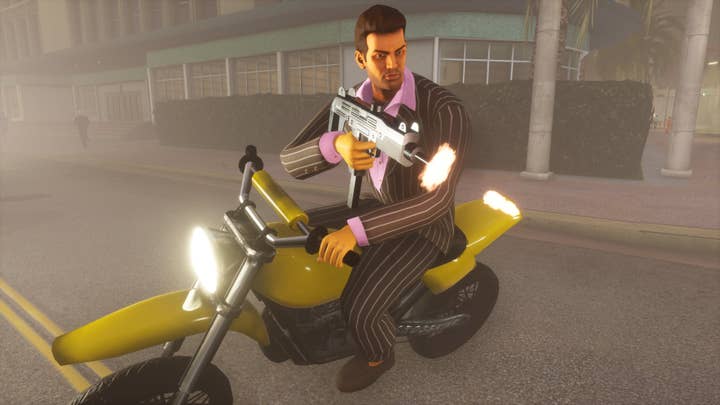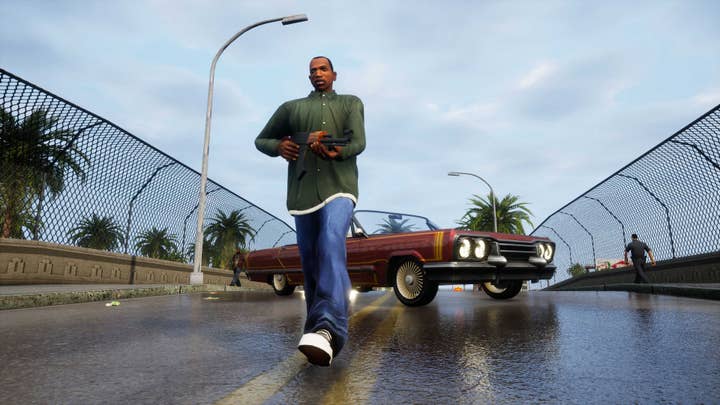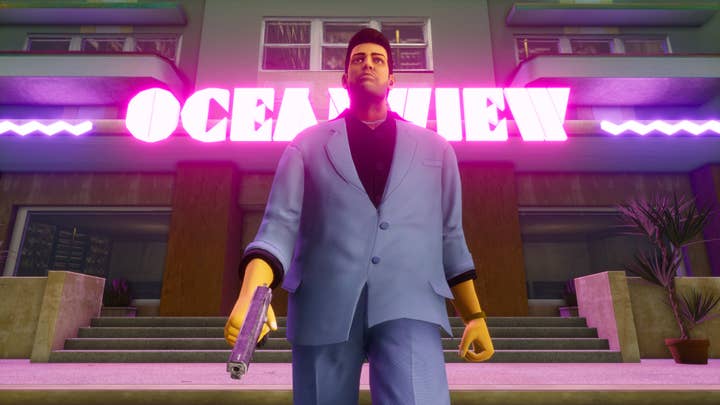Game remasters must respect creative history, not just make a fast buck | Opinion
The disastrous launch of GTA Definitive Edition fails to respect the importance of the games, and shows a lack of regard for the value of the IP itself
The night that the GTA Trilogy Definitive Edition launched, my finger hovered over the buy button in the PlayStation Store for a pretty long time. I knew there weren't any reviews or hands-on pieces about the remastered games yet, but I figured that in the worst case scenario, even a fairly low-effort remastering would still leave intact everything that made these games so iconic -- just with a better resolution and frame-rate, and hopefully some improved controls on the earlier games.
Ultimately, the only reason I didn't buy a copy is because I wanted to wait and see if there was any notable difference between the Xbox Series X and PS5 editions -- plus, I guess, a nagging sense that the last thing my game backlog needs right now is three of the most enormous and absorbing titles of the 2000s popped right on the top of the stack.
Within a few days it was clear that I'd dodged a bullet; the shambolic launch of the Definitive Edition is being touted as this year's Cyberpunk 2077, a highly-anticipated title being released in such a brutally low-quality and unfinished state that it's simply impossible to imagine that the company wasn't completely aware of the problems and still chose the cynical path of launching the game without letting anyone actually see it running before many consumers' money was already safely in their hands.
In some ways, GTA Definitive Edition is less of an outright disaster than Cyberpunk 2077 was at launch but in others, it's far less forgiveable
In some ways, GTA Definitive Edition is less of an outright disaster than Cyberpunk 2077 was at launch -- it's at least actually playable on all of its target platforms -- but in others, it's far less forgiveable. At least Cyberpunk 2077 fell on its face while reaching for some ambitious goals, while the GTA Definitive Edition manages to trip over its own shoelaces while reaching for nothing more lofty than getting a PS2 game to run smoothly on a PS5 -- a system which, for those keeping score at home, has something in the range of 1,700 times more raw graphical and processing power than the PS2 did.
A lot of words have been written and many hours of video recorded about the problems with the Definitive Edition over the past week and, beyond registering my own disappointment and annoyance, I don't have anything to add to the uproar from consumers. What I do think is worthy of thinking about more carefully, however, is the implications of the GTA Definitive Edition brouhaha for one of the most thorny and complex problems the industry faces (or, all too often, pointedly refuses to face): the question of how we preserve access to the cultural history of video games as a medium.
On some levels, what Rockstar set out to do -- leaving aside the fact that they ultimately did it very, very badly -- was a very positive thing from the perspective of preserving access to games. Simply archiving old games in some kind of museum, whether it be real or virtual, is certainly important but it doesn't actually live up to the real promise of cultural preservation, which is ensuring ongoing access to old titles for new audiences.
Updating PS2-era games to make them more available to contemporary audiences is therefore a solid goal; without this work, while the PS2 originals would continue to exist on many millions of discs out there, they would be increasingly inaccessible to most players simply because of the difficulty in getting them up and running on consoles that people actually own. The ability for regular players to engage with the history of the gaming medium without having to buy retro hardware or set up complex emulation software is incredibly important: having a "canon" of defining classics is a key part of any creative medium, and games like GTA 3 are unquestionably an important part of the video games canon.

The problem -- a problem that would have persisted even if the Definitive Edition was actually in any way definitive -- is that Rockstar made a set of decisions around the launch which seriously undermined that whole preservation aspect.
Removing the original versions of the games from digital download stores was an unpleasant act of needless vandalism which the company has thankfully now reversed. Shutting down mod teams who were working on making those originals more accessible and playable on modern hardware is perhaps more understandable, at least if we give the company the benefit of the doubt and believe that they truly had a good-faith intention of releasing the best possible versions of the games, and not the ugly, bug-laden version we actually got.
Rockstar should have been sending out job offers, not cease and desist notices, to GTA's most talented and passionate modders
Old games have a dual existence as both cultural artifacts that should be preserved and made available, and as valuable IP that belongs to its creators -- a balance does need to be found to allow the games to be made available as widely as possible (including, potentially, through the work of modders) without excessively undermining whatever remaining commercial viability they may have.
On the other hand, it ought to raise serious questions at a high level within Rockstar and Take Two that the company was exerting efforts to shut down modders who were unquestionably doing a better and more competent job of updating the GTA trilogy games than Rockstar itself seemed capable of, despite having effectively zero resources. If the company's management had proper oversight of what was happening on this project, they should have been sending out job offers, not cease and desist notices, to GTA's most talented and passionate modders.
Instead, the net result of Rockstar's moves prior to the launch of the Definitive Edition games was that -- prior to the walking back of some of the worst excesses post-launch -- it looked like the original forms of three of the most influential and important games of the 2000s were about to disappear out of reach from the vast majority of consumers. Any consumer wanting to dive into these key parts of the history of the medium would be met with only one version available to them -- a rushed and amateurish port based on a decade-later mobile editions rather than the seminal PS2 originals.
Of course, we have to accept that not every retro update is going to have the resources and talent behind it that you find in something like Halo's Master Chief Collection -- whose updated versions of the early games are arguably the gold standard in this regard, right down to being able to press a button to toggle instantly between the original graphics and the updated visuals. This alone shows how deeply the developers understood that the updates had a secondary responsibility to preserve a piece of gaming history.
Given how well the GTA games have sold, though, a similar level of attention and care would have been more than justified. Instead, the GTA Definitive Edition updates, among their many failures, fail most of all by having no sense whatsoever of that responsibility to the history represented by the original games.

The visual style of GTA Trilogy games is not updated, it is butchered: there is no attempt whatsoever to remain faithful to key aspects that initially set the games apart, like their cinematic colour grading (GTA3 and MGS2 were two almost-contemporaneous titles that really pushed this use of colour grading in games, a major step towards many games looking how they do today) or the incredibly atmospheric use of weather effects.
Even ignoring the bugs and technical flaws, the hollow heart of these "Definitive Editions" is simply that they're not even trying to be definitive. I have no doubt that getting GTA's city maps, models, and scripts into the Unreal Engine was a very challenging task in itself, but doing that should have been just the first step: stopping there and rushing the games out the door without making any attempt to actually replicate their incredibly impactful look and feel misses out on a vast amount of what actually made these games into the influential classics they are. That's disappointing for a fan hoping for a nostalgia kick from replaying PS2-era favourites -- but for a newcomer wanting to understand the influence and legacy of these games, it's devastating.
I don't want to understate how hard the task of actually creating a definitive edition of a classic game for modern hardware actually is -- many of the technical challenges may actually be more difficult than developing a new game from scratch (though overall it's at least a less creatively risky and complex challenge, since the template you're working from is so clear). Nor should we be naïve about the commercial imperatives that underwrite these efforts; we wouldn't get definitive editions of classic movies (often painstakingly and expensively restored) if there wasn't a clear market for them that makes such updates into a profitable enterprise.
The least we should do, however, is respect the medium's creative history enough to make it possible for players to access the original versions of games even after an updated version is released -- let's not get all George Lucas about this, in other words. Ideally, though, publishers with an eye on re-releases of their classic older titles should try to respect their back catalogue as part of a creative canon and treat it accordingly, rather than just looking for ways to make a quick buck from it -- not just because they have a duty to preserve their industry's creative history, but also for straightforward commercial reasons.
The long-term profit from nurturing and respecting these games will far outweigh the cost savings from a cheap remaster that damages a precious brand and harms consumer goodwill.

